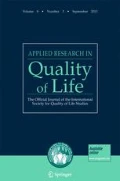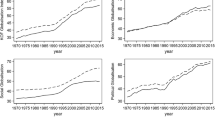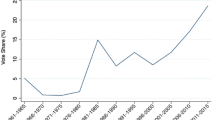Abstract
This paper investigates whether hosting the Olympic Games will improve economic well being of host countries. It is shown that the economic benefits of hosting the Games can last for up to 16 years. The economy of the host country improves after announcement of successful bid. The improvement peaks in the year of the Games and remains significant for 8 years after the Games.






Similar content being viewed by others
Notes
Some host countries allow a full set of Olympic dummies, from 7 years before the host years to 9 years after the Games, to be equal to one in the respective years, whereas the Olympic hosts near the end of the sample timeframe only permit a segment of Olympic dummies to be equal to one. Taking 2012 Olympics as an example of segmented dummies, it allows pre-Olympic dummies from 2005 onwards to be equal to one, zero otherwise.
References
Adranovich, G., Burbank, M. J., & Heying, C. H. (2001). Olympic cities: lessons learned from mega-event politics. Journal of Urban Affairs, 23(2), 113–131.
Arellano, M., & Bond, S. (1991). Some tests of specification for panel data: Monte Carlo evidence and an application to employment equations. Review of Economic Studies, 58, 277–297.
Baum, F. C. (2006). An introduction to modern econometrics using stata. Stata Press.
Bernard, A. F., & Busse, M. R. (2004). Who wins the Olympic Games: economic resources and medal totals. Review of Economics and Statistics, 86, 413–417.
Campbell, A. (1981). The sense of well-being in America. New York: McGraw Hill.
Crafts, N. F. R. (1997). Some dimensions of the “quality of life” during the British industrial revolution. The Economic History Review, 50(4), 617–639.
Easterlin, R. (1974). Does economic growth improve the human lot? Some empirical evidence. In P. A. David & M. W. Reder (Eds.), Nations and households in economic growth: Essays in honour of Moses Abramowitz. New York: Academic.
Easterlin, R. (1995). Will raising the incomes of all increase the happiness of all? Journal of Economic Behaviour and Organization, 27, 35–48.
Hashmi, S. M., Fida, B. A., & Alhayky, A. (2008). Economic impact studies of Beijing 2008 Olympic Games. China-USA Business Review, 7(5), Serial No. 59.
Hirsch, F. (1976). The social limits of growth. Cambridge: Harvard University Press.
Hotchkiss, J. L., Moore, R. E., & Zobay, S. (2003). The impact of the 1996 Summer Olympic Games on employment and wages in Georgia. Southern Economic Journal, 69(3), 691–704.
Johnson, D. K. N., & Ali, A. (2004). A tale of two seasons: participation and medal counts at the Summer and Winter Olympic Games. Social Science Quarterly, 85, 974–993.
Kahneman, D., & Deaton, A. (2010). High income improves evaluation of life but not emotional well-being. Proceedings of the National Academy of Sciences, 107(38), 16489–16493.
Larsen, R. J., Diener, E., & Emmons, R. A. (1984). An evaluation of subjective well-being measures. Social Indicators Research, 17, 1–18.
Lui, H. K., & Suen, W. (2008). Men, money, and medals: an econometric analysis of the Olympic Games. Pacific Economic Review, 13, 1–16.
Lybbert, T. J., & Thilmany, D. D. (2000). Migration effects of Olympic siting: a pooled time cross-sectional analysis of host regions. Annals of Regional Science, 34, 405–420.
Millet, L. (1995). The games of the city. In M. Moragas Spa, & M. Botella (Eds.), The key to success, Barcelona, pp. 188–202.
Ng, Y. K. (1996). Happiness surveys: some comparability issues and an exploratory survey based on just perceivable increments. Social Indicators Research, 38, 1–27.
Nussbaum, M. C., & Sen, A. (1993). The quality of life. Oxford: Oxford University Press.
Preuss, H. (2004). The economics of staging the Olympics: A comparison of the games 1972–2008. Edward Elgar.
Scitovsky, T. (1976). The joyless economy. Oxford: Oxford University Press.
Yao, S. (2006). On economic growth, FDI and exports in China. Applied Economics, 38, 339–351.
Acknowledgments
We would like to thank the editor, an anonymous referee, and Wing Suen for helpful comments, and Mansfield Wong, April Shing, Derek Wang, Joyce Liu, Audrey Wang and Tin Yan Ho for able research assistance. Any remaining errors are ours.
Author information
Authors and Affiliations
Corresponding author
Rights and permissions
About this article
Cite this article
Chong, T.T.L., Hui, P.H. The Olympic Games and the Improvement of Economic Well Being. Applied Research Quality Life 8, 1–14 (2013). https://doi.org/10.1007/s11482-012-9176-8
Received:
Accepted:
Published:
Issue Date:
DOI: https://doi.org/10.1007/s11482-012-9176-8




